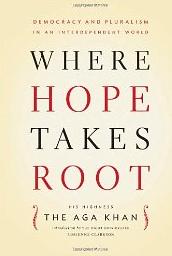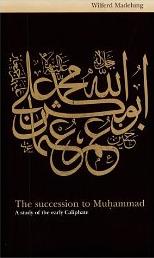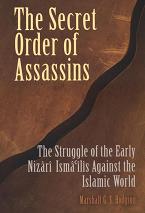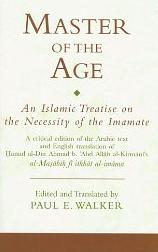Where Hope Takes Root: Democracy and Pluralism in an Independent World
by His Highness the Aga Khan

In this remarkable collection of talks given during the course of six years ending 2008, the Aga Khan surveys the modern world and sets out the principles that inform his vision of peaceful, productive societies. He returns again and again to the three cornerstones upon which his many years of work in the developing world are based: democracy, pluralism and civil society. Democracy, he writes, is always fragile, requiring nurturing in ways that are practical and flexible. Pluralism must be embraced so that it exists in both fact and spirit. And a diverse and engaged civil society, which he broadly defines as including doctors’ and journalists’ associations, women’s groups, social movements, and trade unions, must be supported in countries around the globe. In a world too often divided along economic, political, ethnic, and religious lines, the Aga Khan’s words are welcome, going right to the heart of the most difficult challenges the world faces today. Eloquent, inspiring, and deeply challenging, they express hope and conviction that profound change is possible (publication year: 2008, 146 pages, Douglas & McIntyre).
_______________
Aga Khan III: Selected Speeches and Writings of Sir Sultan Muhammad Shah
Edited by K.K. Aziz

Aga Khan III (1877-1957) was the 48th Imam of Shia Ismaili Muslims. Through his intimate knowledge of Eastern as well as Western cultures, he was able to play a significant role in the international affairs of his time. His long public career had many dimensions. He was a member of the Indian Imperial Legislative Council (1902-1904), President of the All India Muslim League (1906-1913), and the founder of the All India Muslim Conference (1928-1929). He successfully campaigned for separate electorates for all Muslims of India, leading a delegation in 1906 to the Viceroy for this purpose. He was the leader of the muslim, and the entire Indian, delegation to the Round Table Conference in London (1930-1932) which discussed India’s constitutional future. In 1934 he was appointed a member of the British Privy Council. He served as India’s representative at the Conference for the Reduction of Armaments in Geneva in 1932 and as the chief delegate of India at the League of Nations in the 1930s. In 1937 he was unanimously elected President of the League. Aga Khan III was also a social reformer whose concerns included the alleviation of rural poverty and the uplift of women in society. An advocate of modern education, he became an ardent supporter of male and female educational advancement in India and East Africa and played a key role in the development of the Muslim University of Aligarh. A keen connoisseur of culture, he advocated a truly multicultural education blending the best and highest of Western and Eastern literary classics. He was a champion of amity between nations and peoples. In India he consistently supported the ideal of Hindu-Muslim unity, reminding both that India was their common parent. On the international scene he strove strenuously for the ideal of world peace.
Coming from diverse and often unobtainable sources, this monumental work by the late K. K. Aziz covering the years from 1902 to 1955, represents the first ever systematic publication of the speeches and writings of a major Muslim figure on the world stage in the first half of the twentieth century. Among the topics covered are constitutional progress in India, education, rural development, Hindu-Muslim unity, Indians in Africa, the importance of science and technology, Turkey after World War I, the renaissance of Islamic culture, Persian poetry, the fortunes of the League of Nations,the status of women, Islam in the modern age and Pan-Islamism (publication date: 1998, 2 volumes boxed set, 1541 pages, Kegan Paul International).
_____________
The Succession to Muhammad: A Study of the Early Caliphate
by Wilfred Madelung

In a convincing reinterpretation of early Islamic history, Wilferd Madelung examines the conflict that developed after the death of Muhammad for control of the Muslim community. He demonstrates how this conflict, which marked the demise of the first four caliphs, resulted in the lasting schism between Sunnite and Shi’ite Islam. In contrast to recent scholarly trends, the author takes up the Shi’i cause, arguing in defense of the succession of ‘Ali. This book will make a major scholarly contribution to the debate over succession (publication year: 1998, 432 pages, Cambridge University Press)
Excerpts from book reviews:
“The Succession of Muhammad is not a work for the faint of heart….it is a compelling reassessment of the Rashidun caliphate that should be required reading for everyone interested in the historiography of early Islam.” James E. Lindsay, MESA Bulletin
“For those who have been lamenting the decline or near demise of solid, historical narratives, this is a book to cherish.” Jane Dammen McAuliffe, Religious Studies Review
“This erudite, complex, and fascinating book rexamines the struggle over and for the office of caliph. This book performs a valuable service by counter-balancing popular views about the origins and development of Shi`ism.” Elton L. Daniel, Middle East Journal
“Madelung brilliantly dissects the myriad, conflicting accounts of Ali’s numerous confrontations, as well as the final one…Bound to provoke controversy, this volume has laid down a marker. Critics will be expected to attain a standard of scholarship considerably more incisive than all too much of what has been available to date.” Andrew J. Newman, University of Edinburgh
“…The response this book should provoke has possibilities for opening up a discussion of the succession to leardership in general at the endo f Late Antiquity.” Journal of Near Eastern Studies
______________
Isma’ili Modern: Globalization and Identity in a Muslim Community (FORTHCOMING: October 28, 2010)
by Jonah Steinberg

The Isma’ili Muslims, a major sect of Shi’i Islam, form a community that is intriguing in its deterritorialized social organization. Informed by the richness of Isma’ili history, theories of transnationalism and globalization, and firsthand ethnographic fieldwork in the Himalayan regions of Tajikistan and Pakistan as well as in Europe, Jonah Steinberg investigates Isma’ili Muslims and the development of their remarkable and expansive twenty-first-century global structures.
Led by a charismatic European-based hereditary Imam, Prince Karim Aga Khan IV, global Isma’ili organizations make available an astonishing array of services – social, economic, political, and religious–to some three to five million subjects stretching from Afghanistan to England, from Pakistan to Tanzania. Steinberg argues that this intricate and highly integrated network enables a new kind of shared identity and citizenship, one that goes well beyond the sense of community maintained by other diasporic populations. Of note in this process is the rapid assimilation in the postcolonial period of once-isolated societies into the intensively centralized Isma’ili structure. Also remarkable is the Isma’ilis’ self-presentation, contrary to common characterizations of Islam in the mass media, as a Muslim society that is broadly sympathetic to capitalist systems, opposed to fundamentalism, and distinctly modern in orientation. Steinberg’s unique journey into remote mountain regions highlights today’s rapidly shifting meanings of citizenship, faith, and identity and reveals their global scale (publication date: October, 28, 2010, 256 pages, University of North Carolina Press)
Review excerpt:
“This is a fascinating and unrivaled account of transnational Isma’ilism. Steinberg admirably brings together globalization theories and fascinating ethnographic material to produce a rich narrative of this interesting community. It will be the most important account of contemporary Isma’ilism yet published.” Faisal Devji, author of The Terrorist in Search of Humanity: Militant Islam and Global Politics
____________
Nasir Khusraw: Ruby of Badakhshan
by Alice Hunsberger

A renowned poet, philosopher and traveller of the 11th century, Nasir-i Khusraw was also a major Ismaili thinker and author of the Iranian lands. His Ismaili writings, exclusively in Persian, have been preserved through the centuries by the Ismaili communities of the upper Oxus and Badakhshan, now situated in Tajikistan and Afghanistan. This is a study of Nasir-i Khusraw’s life and aspects of his theological and philosophical thought in the context of his times. Author Alice Hunsberger has devoted several years of study to this subject, and includes in the book a detailed classification of Nasir’s different genres of writings, and a summary of medieval as well as modern biographical studies. In this highly informative and pleasantly readble book, the author succinctly introduces the Ismaili poet and da’i (missionary) to the general reader, to his students, and to academics (publication year: 2000/2003, 288 pages, I.B. Tauris).
Alice Hunsberger was interviewed by Rachel Kohn of Australia’s ABC Radio. This highly informative interview can be read on this Web site by clicking Voices: Alice Hunsberger on Nasir Khushraw – Poet of Substance
_______________
The Order of Assassins: The Struggle of the Early Nizari Ismailis Against the Islamic World
by Marshall G. Hodgson

The sect known as “the Assassins,” a corruption of an Arabic word that means hashish smoker, is familiar to the West as a mystical cult of killers led by the “Man in the Mountain” encountered by the Crusaders. But it was not defeat at the hands of Christians that ended more than a century of Assassin rule; it was the massive and brutal invasion of Mongols from the East who conquered Assassin strong points and mountain fortifications one by one, crushing nearly all traces of this once fearsome sect. For nearly two centuries the Fâtimids, Shi’ite Muslims who believed Mohammed’s daughter Fâtimah was his successor, attempted to control the Islamic world from their seat in Cairo.
Following the death of the Fâtimid caliphate al Mustansir in 1094, members of a faction in Persia that supported a deposed claimant to the caliphate, Nizâr, believed they now represented Fâtimid interests. These Nizârî Ismâî’lîs ended up creating their own state in parts of present-day Syria, Iraq, and Iran.
Marshall Hodgson’s first major book, The Secret Order of the Assassins remains the most complete history of the Assassins. Beginning the story with the separation of Sunnis and Shi’ites and the rise of Ismâî’lîsm, an offshoot of Shi’ism, Hodgson traces the long and complex history of power struggles within Islam that led ultimately to the separation of the Nizârî Ismâî’lîs and their direct challenge to Muslim leadership. Hodgson goes on to explain the principles of the movement, provides an examination of their sacred texts, and follows the history of the group from the pinnacle of power in the mid-eleventh century to its legacy in the form of small pockets of followers in parts of contemporary Syria and India. Long out of print and appearing for the first time in paperback, this book is an illuminating study in the history of Islam (publication year: 2005, 368 pages, University of Pennsylvania Press. Note: Original 1st edition was published in 1955)
______________
Master of the Age: An Islamic Treatise on the Necessity of Imamate
by Paul Walker

Few Islamic doctrines have provoked as much division and disagreement as those bound up with the imamate: or the office of supreme leader of the Muslim community following the Prophet’s death. In the medieval period, while the caliphate still existed, rivalry among claimants to that position was especially bitter and intense, causing an instability that required resolution. In the early 5th/11th century the great Ismaili thinker Hamid al-Din al-Kirmani was mandated to compose a treatise called Lights to Illuminate the Proof of the Imamate (al-Masabih fi ithbat al-imama) in the bold hope of convincing Fakhr al-Mulk, the Shi’i wazir of the Buyids in Baghdad, to abandon the Abbasids and support instead the Fatimid caliph al-Hakim. For that purpose, he assembled an interconnected series of philosophical proofs, all pointing logically to the absolute necessity of the imamate. This work is unique, both in the precision of its argumentation and in the historical circumstances of its composition. The text appears here in a modern critical edition of the Arabic original with a complete translation, introduction and notes, and will be of immense interest to scholars and students of classical Islam (publication year: 2008, 320 pages, I. B. Tauris).
______________
The Orations of the Fatimid Caliphs: Festival Sermons of Ismaili Imams
by Paul E. Walker

The Fatimid empire was a highly sophisticated and cosmopolitan regime that flourished from the beginning of the 10th to the end of the 12th century. Under the enlightened rule of the Fatimid Caliphs, Cairo was founded as the nucleus of an imperium that extended from Arabia in the east to present-day Morocco in the west. Dynamic rulers like the the fourth caliph al-Mu’izz (who conquered Egypt and founded his new capital there) were remarkable not only for their extensive conquests but also for combining secular with religious legitimacy. As living imams of the Ismaili branch of Shi’ism, they exercised authority over both spiritual and secular domains. The sacred dimension of their mandate was manifested most powerfully twice a year, when the imam-Caliphs personally delivered sermons, or khutbas, to their subjects, to coincide with the great feasts and festivals of fast-breaking and sacrifice. While few of these sermons have survived, those that have endured vividly evoke both of the atmosphere of the occasion and the words uttered on it. Paul E. Walker here provides unique access to these orations by presenting the Arabic original and a complete English translation of all the khutbas now extant. He also offers a history of the festival sermons and explores their key themes and rhetorical strategies (publication year: 2009, 256 pages, I.B. Tauris).
_____________
Under the Eaves of Architecture: The Aga Khan: Builder and Patron
by Philip Jodidio

This thematically arranged book displays the full range of the Aga Khan’s patronage of architecture.
The Aga Khan is one of the most ardent patrons of architecture and historic preservation in the world. Since inheriting his title as spiritual leader of the Shia Imami Ismaili Muslims, usually known as Ismailis, fifty years ago, he has fostered and commissioned numerous structures and restored a multitude of buildings from North America to East Africa. The prestigious Aga Khan Award for Architecture, first given in 1980, recognizes projects that benefit the Muslim world for their excellence in contemporary design, community improvement and development, restoration, re-use, and area conservation. For the first time, this book presents projects from universities and historic restoration programs that bear the Aga Khan’s name to religious centers, museums, and development efforts in more than twenty countries. Through the Aga Khan Development Network, the Aga Khan occupies a unique place in the world of architecture and this book reveals the range and breadth of his activities (publication year: 2007, 214 pages, Prestel Publishing).
Article publication date: September 15, 2010.
__________________
Editor’s note: Simerg will be publishing book briefs of publications related to Shia Ismaili Studies on a regular basis. The books briefs are compiled from product descriptions and abstracts issued by the publishers and authors as well as other detailed book reviews where available. Please visit Amazon.com and other on-line stores (example Chapters.ca, Borders.com, Barnesandnoble.com, Powells.com) for pricing and more information about the books listed above. Many books are available as good used copies at decent prices; some out of print books may be costly – for example, the 1st edition of Hodgson’s “Order of Assassins” (1955) is available at Amazon for $286.99, while its later paper back edition (2005) is sold for only $24.75.
For more book briefs, please click Ismaili Studies: Book Briefs (I)
Please also visit the Home page. For articles posted on this Web site since its launch in March 2009, please click What’s New

Thank you for the book briefs. I look forward to reading Wilfred Madelung’s volume.
Kind regards
I look forward to reading Jonah’s book. In terms of controversies and misunderstandings currrently in progress in our world, I think we’ll now see a host of groups trying to understand: media proliferation of ‘who is doing what’ for inclusiveness and in understanding failed democracies etc. than ever before. Interesting how media , money, and power flavor the world and its thinking. Man and woman can think on their own. Funny how adulations carry one’s decisions these days, versus what His Highness had to frankly tell us: ethics, humility, generosity, tolerance which is, frankly, what we’ve always, should have always been about. Everyone.